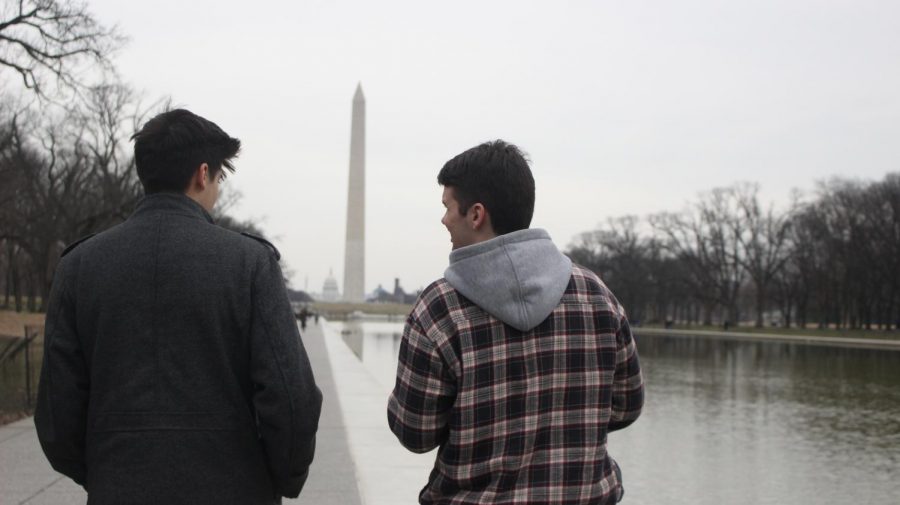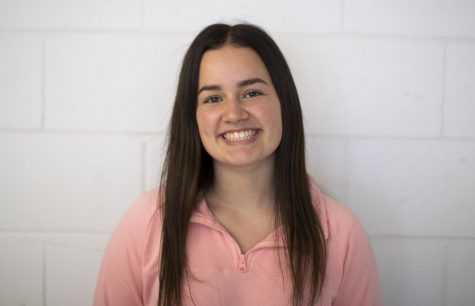JSA risks losing trips, stability unless officialized
Seniors Dane Tedder of Ocean and Vaughn Battista of Tinton Falls on a JSA trip in Washington DC.
January 17, 2020
For the CHS chapter of the Junior State of America (JSA), yearly conventions aren’t just a way of racking up best speaker awards, but a chance to socialize with other students across the east coast, sharpen public speaking through debates and learn the inner-workings of American politics. These trips, which include around 20 to 25 students, are essential to the club’s mission and activity, according to co-president and senior Vaughn Battista of Tinton Falls. But while all clubs face challenges as the senior leadership approaches graduation, JSA is facing an obstacle like no other: staying alive.
According to the national JSA organization, each chapter must bring a teacher adviser to a convention, not just any parent or guardian. For Battista, this means using a loophole: having his mother, who is not a CHS faculty member, chaperone conventions through her teaching license.
“We need to keep cycling through volunteer advisors, which is something we can’t do forever,” Battista said. “It means the future of the club is always a question.”
Prior to Battista’s tenure leading the club, chapter founder and Class of 2018 alum Samara Ghali used the same loophole to an even higher degree. Ghali’s mother, who works as a doctor, earned her substitute teacher certification only to qualify as a teacher adviser under JSA rules.
“Starting an official club at CHS is a huge struggle considering everything you need to do, and how much resistance from the administration you’ll inevitably face,” Ghali said. “Many factors are out of your control, like the money to pay advisers. My mom ended up being our temporary unpaid adviser.”
When Ghali graduated, the chapter was lucky enough to have Battista’s mother as a replacement. But now, the club faces a two-fold problem. They must first find a teacher who can take on the time commitment of advising JSA. The current in-school adviser, physics teacher Steve Godkin, can attend weekly meetings but can’t afford to give up three weekends per year for trips.
Beside time commitments, another issue stands in the way: liability. The adviser of an official club can attend trips with any possible liability falling under CHS and/or the district as a whole. But for an unofficial club like JSA, if anything such as student injury or misconduct were to occur, the individual teachers are at fault instead of the district. With that risk on the line, the club struggles to find a permanent adviser without the safety net of official status.
After years of roadblocks, Battista said that if JSA were to not solve their adviser issue by June, the chapter faces a high chance of collapsing. It leaves the club’s council with no other option but to try for officialization, a status granted to clubs like SkillsUSA, NAHS and The Inkblot.
However, the district only allows a certain number of official clubs due to funding constraints, a limit that has already been reached according to JSA co-president and senior Dane Tedder of Ocean.
“We definitely think we’re deserving of it,” he said. “But there were already 10 official clubs at the [time of JSA’s formation.] We can’t take an official spot without kicking somebody out or maybe trying to change the rules.”
“It’s is going to be a long and arduous process,” Battista added. “We’re going to fight but if the district says no, then the district says no. There’s nothing we can do.”
Even in a worst case scenario, the club could continue with only in-school activity, such as weekly debates. But for Tedder, it’s just simply not the same.
“A huge part of being in JSA is going to conventions and interacting with kids specifically who you’ve never met before,” Tedder explained. “The most important part of civil engagement that people need to learn [is] talking to people who have views different than your own.”
Ghali would mourn the loss of JSA. “This club is much too powerful and beautiful to let go, and the ball is in our teachers’ court,” Ghali said.
Battista mentioned the possibility of the club filling the role of a “vague political/debate club” if conventions were to fall through, but ultimately stood in agreement with Tedder.
“If we don’t engage with the actual JSA organization through conventions and other means, which we can’t do if we’re not official, we’re not JSA,” he said. “It literally cannot be called JSA.”





